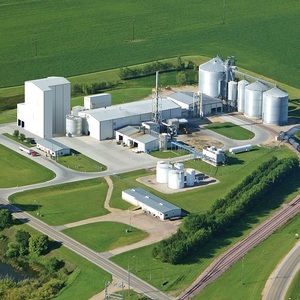Gevo releases third quarter results, discusses future plans

PHOTO: Gevo Inc.
November 7, 2018
BY Erin Krueger
On Nov. 6, Gevo Inc. released third quarter financial results and hosted an investor call discussing efforts to decarbonize its Luverne, Minnesota, biorefinery and develop business opportunities for its isobutanol, jet fuel and isooctane products.
During the call, Pat Gruber, CEO of Gevo, said the company began installation of Shockwave LLC’s technology at its Luverne plant during the third quarter. The technology takes in ground corn and separates into germ, bran and starch streams. Gruber said the germ contains a lot of protein and oil and noted the company will be installing equipment to capture that food-grade oil at the front end of its production process.
Gruber also said the technology and equipment will allow the company to complete process optimizations to help reduce the facility’s carbon footprint while producing high-protein animal feed. The Shockwave technology is currently expected to operational by the second quarter of 2019.
Advertisement
Advertisement
In addition, Gruber said Gevo is continuing efforts to decarbonize the Luverne plant by taking steps to replace fossil-based energy sources for electricity and steam. However, he didn’t offer specific information on what types of non-fossil technologies the company intends to employ.
Gruber also discussed the company’s hydrocarbon plant in Silsbee, Texas, that produces jet fuel and isooctane. He said the facility has been expanded to produce 100,000 gallons annually. “The product from this plant is being sold commercially in the jet market and into the specialty gasoline blend stock market,” he said, and noted that all of the Silsbee production capacity is under contract for 2019 and 2020.
According to Gruber, Gevo is developing plans to produce additional jet fuel and isooctane as an intermediate step prior to building out the previously announced plant expansion at Luverne.
Advertisement
Advertisement
Regarding the licensing activities, Gruber said the company is still working with its partner Praj with the goal of entering a commercial license agreement, noting that Gevo currently expects to license its technology to companies that Praj has strong relationships with, particularly those with cane sugar molasses as a feedstock. Gruber also noted that it has also entered memorandum of understandings (MOUs) with other companies
Gevo reported $8.6 million in revenue for the third quarter, up from $7.7 million during the same period of last year. Revenues derived at the Luverne facility related to ethanol sales and related products reached $8.1 million, up $700,000 when compared to the same period of 2017. Gevo primarily attributed the increase to higher ethanol production and distillers grains pricing.
The company reported a gross loss of $2.1 million for the quarter, compared to a gross loss of $2 million during the second quarter of 2017. Net loss for the quarter was $6.9 million, compared to a net loss of $4.2 million during the same period of last year.
Related Stories
The USDA’s Risk Management Agency is implementing multiple changes to the Camelina pilot insurance program for the 2026 and succeeding crop years. The changes will expand coverage options and provide greater flexibility for producers.
EcoCeres Inc. has signed a multi-year agreement to supply British Airways with sustainable aviation fuel (SAF). The fuel will be produced from 100% waste-based biomass feedstock, such as used cooking oil (UCO).
SAF Magazine and the Commercial Aviation Alternative Fuels Initiative announced the preliminary agenda for the North American SAF Conference and Expo, being held Sept. 22-24 at the Minneapolis Convention Center in Minneapolis, Minnesota.
Saipem has been awarded an EPC contract by Enilive for the expansion of the company’s biorefinery in Porto Marghera, near Venice. The project will boost total nameplate capacity and enable the production of SAF.
Global digital shipbuilder Incat Crowther announced on June 11 the company has been commissioned by Los Angeles operator Catalina Express to design a new low-emission, renewable diesel-powered passenger ferry.
Upcoming Events










